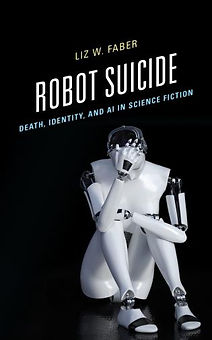Books
The Computer's Voice:
From Star Trek to Siri

Considering Star Trek, 2001: A Space Odyssey, Her, and more, this book explores contentious questions around gender: its fundamental constructedness, the rigidity of the gender binary, and culturally situated attitudes on male and female embodiment. Going beyond current scholarship on robots and AI to focus on voice-interactive computers, The Computer’s Voice breaks new ground in questions surrounding media, technology, and gender.
Recipient of the 2022 Popular Culture Association Emily Toth Award for Best Single Work in Women's Studies
Robot Suicide:
Death, Identity, and AI in Science Fiction

In Robot Suicide: Death, Identity, and AI in Science Fiction, Liz W Faber blends cultural studies, philosophy, sociology, and medical sciences to show how fictional robots hold up a mirror to our cultural perceptions about suicide and can help us rethink real-world policies regarding mental health. For decades, we’ve been asking whether we could make a robot live; but a new question is whether a living robot could make itself die. And if it could, how might we humans react? Suicide is a longstanding taboo in Western culture, particularly in relationship to mental health, marginalized identities, and individual choice. But science fiction offers us space to tackle the taboo by exploring whether and under what circumstances robots—as metaphorical stand-ins for humans—might choose to die. Faber looks at a broad range of science fiction, from classics like The Terminator franchise to recent hits like C. Robert Cargill’s novel Sea of Rust.
Under the Mistletoe:
Holiday Romance in Popular Culture

When you think of holiday romance in popular culture, you probably imagine the formulaic made-for-TV movies we all love to watch: a career gal moves from the big city to a small town, where she finds the love of her life and the true meaning of Christmas. Yet, as with so much of the romance genre, our favorite holiday movies, books, TV episodes, and plays are so much richer than the oft-derided formula. The 22 chapters in this volume turn a scholarly eye to one of our most beloved and under-examined subgenres, offering celebrations and criticisms alike of Christmas, New Year, Hanukkah, and Diwali romances.
This work includes voices from global scholars across an impressive breadth of disciplines: literature, history, theatre, media, gender and sexuality studies, sociology, psychology, anthropology, law, and victim studies. Readers will delight in celebrations of old classics like Christmas in Connecticut, new favorites like A Holly Jolly Diwali, and everything in between.
Special Issue on Robots & Labor

[A]s the essays in this special issue demonstrate, fictional robots are often not just robots; rather, they are also metaphorical portraits of humans, representative of the ways we build systems of oppression and dehumanization. The essays presented here offer a broad array of pop culture research on robots and labor, including analyses of literature, film, television, video games, advertising, music, and fan culture. Using a range of methods and theoretical frameworks, the contributors stretch the definition of labor to include not just the literal workforce but also emotional labor, semantic labor, and the labor of birth. Throughout, they uncover new ideas about humanity’s fraught relationships with technology as well as humanity itself. I have organized these fifteen essays around broad categorizations of analysis: we begin with a theory-driven reflection on robots and labor, followed by six different cultural histories, five in-depth case studies, and finally two essays on artificial intelligence as both production and producer.
